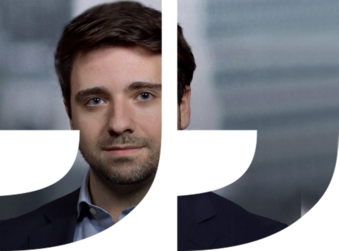What does a quantitative analyst in market finance do ?
A quantitative analyst in market finance develops and applies scientific methods in the field of finance to help companies make the right investment decisions.
Also known as a quant, they analyze mathematical data to minimize risks, optimize transaction security, predict market movements, and correctly position in terms of pricing.
These experts work for banks, insurance companies, specialized financial software publishers for trading, investment funds, consulting firms, or traders. The Master's program in Mathematics and its Applications at Université Paris Dauphine-PSL prepares students for this profession by combining fundamental mathematics teachings with applications in economics and finance.
Words from our alumni
"I enjoy viewing the markets from a systematic perspective."

What does the daily work of a quantitative trader entail?
A quantitative trader (also known as a quant, quantitative analyst, systematic trader, electronic trader, or algorithmic trader) is primarily a trader, so many of their daily tasks are the “classic” trader tasks: checking the profitability of instruments, covering risk, anticipating the next market trend, or discussing trades with clients.
The difference from a voice trader is that a quantitative trader implements a set of commands – an algorithm – to send prices to clients, which explains the other name of “zero touch trader”: the quantitative trader lets the algorithm they have implemented respond for them. Therefore, most of the daily work consists of implementing or perfecting the trading algorithm.
What aspect of this profession interests you the most?
I'm passionate about financial markets but have often criticized market participants for their lack of rigorous approach. The job of a quantitative trader approaches trading from a scientific angle: solid knowledge of mathematics, both financial and general (pricing theories, machine learning, Big Data, etc.), statistics, and computer science is necessary to excel at this position.
I appreciate viewing the markets from a systematic perspective and asking questions like "given the data, can I price a Microsoft bond like a Coca-Cola bond?" From a technical standpoint, the balance sheets of the two companies are drastically different, yet the data can reveal surprises.
Why did you choose Université Paris Dauphine-PSL for your training?
The quality of mathematics teaching during my Bachelor's in Applied Mathematics at Dauphine impressed me, so naturally, I decided to continue with a Master's in Applied Mathematics.
What advice would you give to a student wishing to pursue a career as a quantitative trader?
Having a solid basis in mathematics and market finance is necessary! You don't need to be an expert in a predefined branch of mathematics; it's better to review your introductory courses to probabilities/statistics from your second or third year and then deepen them with Master's level statistical inference methods (like Monte Carlo, machine learning...). For the basics of market finance, it comes more easily by paying attention to the markets (for personal profit or pure interest), reading the news (The Wall Street Journal is a good resource), or simply discussing with friends/alumni in trading.
DAVID SMADJA
QUANTITATIVE TRADER - JPMORGAN
His background:
Master MASEF
Areas of work of the quantitative analyst (QUANT)
The job of a quantitative analyst in market finance requires advanced expertise in mathematics, finance, and computer science. Their role varies depending on the companies for which they work and their responsibilities. Given the diversity and technicality of their missions, the analyst must specialize in a field to optimally perform their job.

Daily tasks
During their career, they will be tasked with the following:
- Analyze market trends.
- Design quantitative models.
- Develop software and analytical tools for traders.
- Analyze and interpret statistical data.
- Develop and test new models and analytical programs.
- Maintain and modify financial models.
- Collaborate with teams of mathematicians and computer engineers.
- Discuss with finance professionals about strategies to adopt.
- Communicate results to companies.
Salaries and career path
Quantitative analysts in market finance are highly sought after by companies and command attractive salaries even at the beginning of their careers. Thus, the salary of a junior quantitative analyst ranges between €45,000 and €50,000 gross per year depending on the tasks they perform.
After 4 to 5 years of experience, they can aspire to a salary ranging from €60,000 to €100,000 gross per year, with the possibility of exceeding these amounts by including variable compensation.
Due to their multidisciplinary profile, the career progression opportunities for a quantitative analyst in market finance are numerous. They could become a trader or structurer, but also to move into management.

Required Skills
- High expertise in mathematics, computer science, and statistical analysis.
- Masteing mathematical concepts (linear algebra, differential equations, probabilities, statistics...) and pricing models.
- Be able to code in C++, MATLAB, SAS, or S-PLUS.
- Mastering Java, .NET, VBA, and Excel.
- Managing data and Big Data tools.
- Being fluent in english.
- Possessing good analytical and synthesis skills.
- Pressure resistance.
- Autonomy.
- Organization.
- Good communication skills.
- Team player.
- Diligence.
How to become a quantitative analyst?
Becoming a quantitative analyst in market finance requires solid theoretical knowledge in various areas such as mathematics, computer science, and finance. To work in this field, it is necessary to achieve a BAC+5 level by following a program in mathematics combined with knowledge in economics and computer science. This allows future graduates to master advanced mathematical techniques by applying them in the field of risk management.
Training to become a quantitative analyst in market finance at Université Paris Dauphine – PSL
Training to become a quantitative analyst in market finance at Université Paris Dauphine – PSL
Thanks to its collaboration with the École Normale Supérieure – PSL, Mines Paris-PSL, and the Paris Observatory – PSL, Université Paris Dauphine-PSL allows students to follow a solid scientific education while benefiting from an opening to various fields of application.
Students of the MASH (Mathematics, Learning, and Humanities) and MASEF (Mathematics of Insurance, Economy, and Finance) specializations benefit from excellent training in mathematics and statistics as well as practical applications in management sciences. Upon completion of their studies, they can apply for a position as a quantitative analyst.






